Complete Guide To Insomnia: Symptoms, Causes And Treatment
Insomnia can be a highly debilitating condition, which impacts someone’s energy levels in everyday life. It is far more than being unable to sleep, and it can have a significant impact on someone’s life. By definition, insomnia can last between a few days or as long as three months.
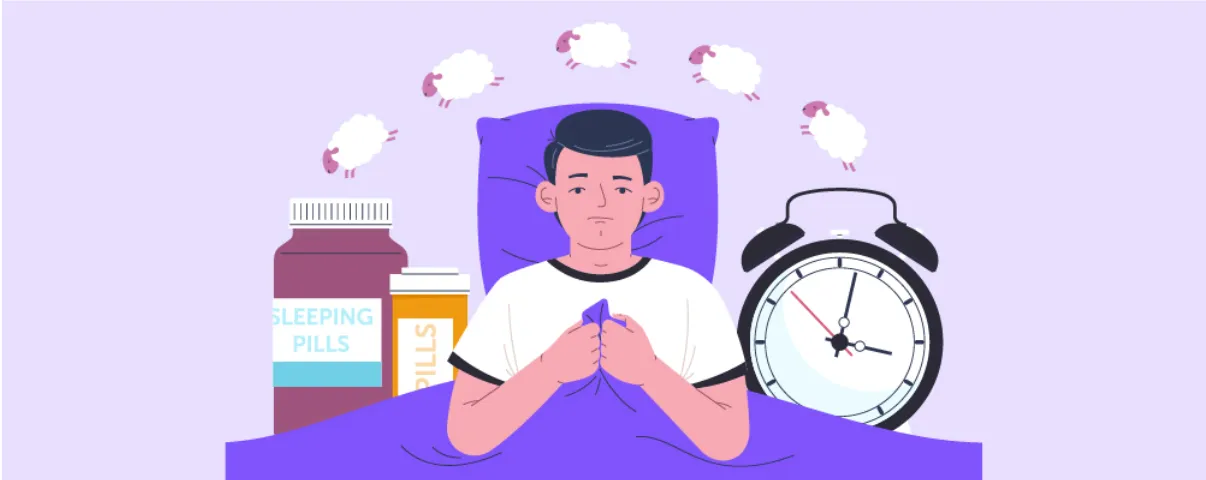
There are multiple ways in which insomnia can arise, and the most common one tends to be stress. Chronic insomnia affects around 15 to 35 percent1 of adults, so it’s important to focus on reducing the symptoms and allowing individuals to get a better nights’ rest consistently.
This is a complete look into insomnia, including common symptoms, potential causes, and treatment methods. Something which is frequently overlooked is the fact that there are different types of insomnia. These vary with the different symptoms experienced, and the ways in which someone’s quality of sleep is affected. Here is a guide to insomnia, and how it is dealt with from a healthcare perspective.
Symptoms Of Insomnia

What are the most common indicators of insomnia? It can be surprising how many people typically dismiss their current difficulties with sleeping (2.) Here are some of the most common symptoms of insomnia to look out for.
Waking Up During The Night
Insomnia can present itself in the form of waking up in the night (3.) Many people find themselves waking up in the middle of the night for seemingly no reason, when they still have several hours before they need to be awake and getting ready for the day.
Even if it is easy for you to fall asleep, frequently waking up during the night can be highly limiting in the long run. This is because a disrupted nights’ sleep has links with other insomnia symptoms.
Some people find themselves waking up during the night on multiple occasions, while others wake up and cannot get back to sleep. Whichever situation is relevant to you, it is worth taking a note of how you feel and the thoughts running through your head when you wake up. You may find a running trend in this way, that can be dealt with during the day.
Difficulty Falling Asleep
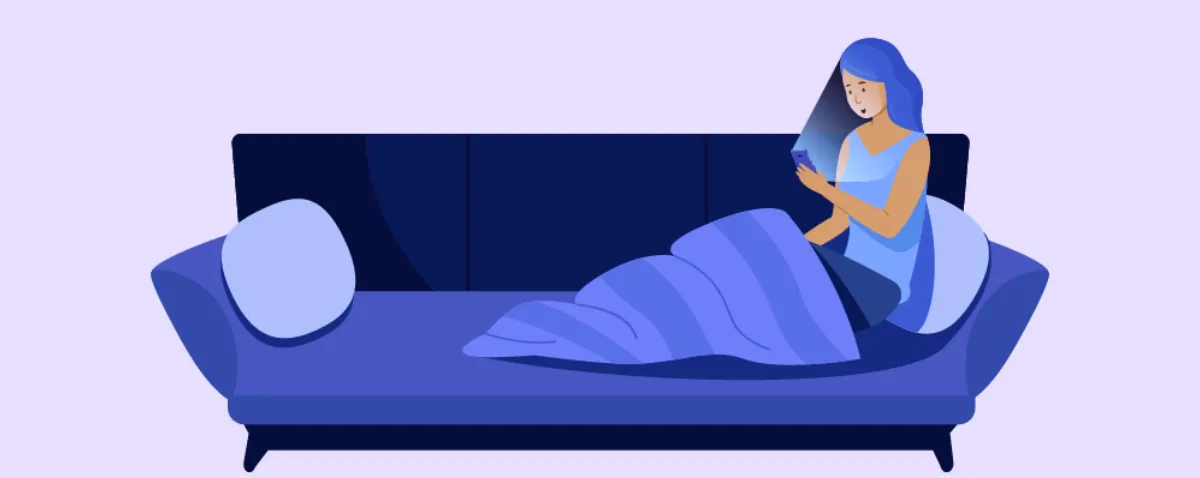
Similarly, it can be harder for someone with insomnia to fall asleep in the first place. This can turn into a fear surrounding bedtime, or continuous worrying about falling asleep (4.) This is one of the most common examples of insomnia, and many individuals find themselves struggling to calm their minds for the night.
The brain tends to associate certain feelings or experiences with a particular part of our routine. Because of this, individuals can start to feel anxious when it is time to fall asleep. In turn, this makes it more challenging to fall asleep.
Practicing good sleep habits is the key to challenging this feeling of negativity that surrounds bedtime. More on the types of routine changes that can be used in order to create a more positive association with bedtime can be found below.
Sleep Apnea
There is also evidence to suggest sleep apnea can lead to insomnia. This is because it is the brain actively inhibiting its ability to fall asleep, which is actively avoiding the experience of apnea or disrupted breathing while sleeping.
The brain can register the sleep apnea as life-threatening, and it has been known to induce insomnia in order to prevent this experience(5.) Experiencing a shortness of breath while sleeping can be fatal, and it can impact your body’s overall functioning.
Over time, this can result in high blood pressure (6), memory loss, or a stroke in adults (4.) It is no surprise that sleep apnea has been associated with insomnia, considering the different ways that it can impact someone’s health as a whole.
Restless Leg Syndrome
Restless leg syndrome has been associated with insomnia. The overwhelming urge to move one or both legs at seemingly random times, or when you are trying to rest, is a direct result of a nervous system response (7.) This means that you could experience this due to stress, lifestyle changes, and more.
Because of the nature of this condition, it is no surprise that restless leg syndrome is something that is more common in pregnant individuals. This has contributed to insomnia in many cases (8.) If you suffer from restless leg syndrome or an uncontrollable urge to move your legs at night or during the day, then it could be worth speaking with your doctor.
Loud Snoring
Similarly, individuals that suffer with obstructive sleep apnea, or conditions that can impact their sleep overall, are far more likely to be loud snorers when they are sleeping (9.) There are strong links between very disruptive snoring and sleep apnea. Both of these can lead to insomnia (10.)
Any issue that has been linked to your airway in general should be addressed with an ear, nose, and throat specialist. Loud snoring that is audible for family members in other rooms, your roommate, or partner, should be reported to a specialist. This can be a sign of an issue with your respiratory system as a whole, and it is worth getting it checked out if possible.
Waking Up Early
If you find yourself consistently waking up early, even on days that you planned to lay in for several hours, then it could be a symptom of insomnia (4.) There are different factors that can affect a person’s circadian rhythm, and cause them to lose sleep from waking up early (11.)
Being unable to get back to sleep can be irritating, especially if you still feel tired. It can eventually impact your everyday life if this becomes a regular occurrence. Not being able to get enough sleep is frustrating, and it is easy to develop low feelings and become emotional when this happens frequently.
Daytime Sleepiness
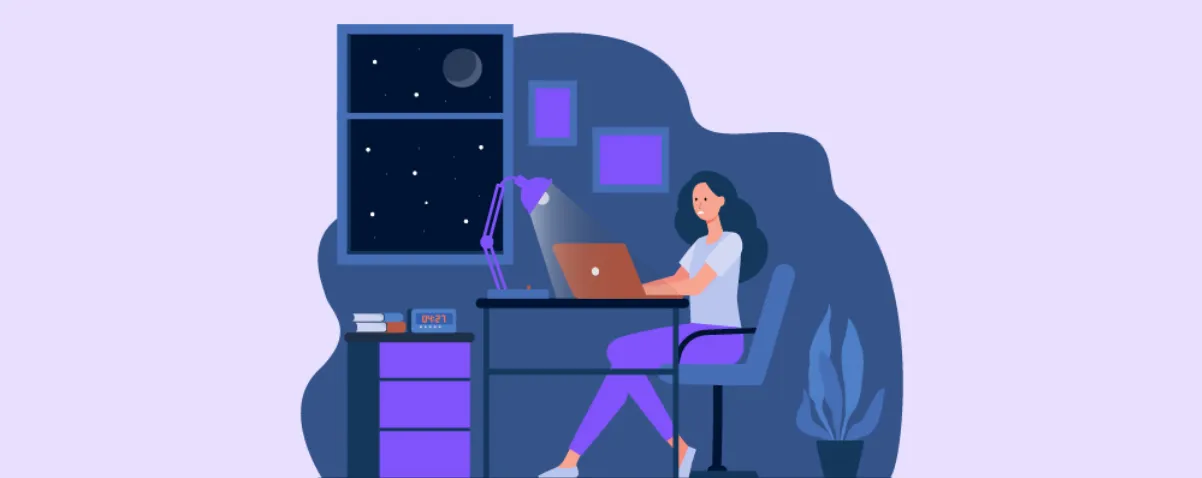
Insomnia can interfere with everyday activities. Feeling sleepy during the day is likely for someone that is suffering from insomnia. This can impact a person’s level of alertness, and even cause them to miss certain warning signs or potential issues (12.)
It can feel like you are in a dazed state in severe cases. Most individuals suffering from insomnia may find themselves struggling with their general state of alertness. In some cases, this can make it more difficult to engage in everyday activities such as work.
Daytime Tiredness
Similarly, individuals with insomnia can experience tiredness in the day. While this may seem like the same thing as sleepiness, the two are slightly different. There is a frustration and an overall sense of having run out of patience that comes with tiredness.
Sleepiness is usually experienced in a daze-like state, while tiredness is a feeling of heavy eyelids, as if you cannot physically keep yourself awake, and it can present itself in irritability, increased frustration, and feeling physically exhausted (13.)
Not Feeling Well Rested
Likewise, it is likely that someone who is suffering from insomnia will not feel well-rested on the whole. This is usually caused by a lack of sleep, or waking up and not feeling like you slept well that night (12.)
The human body needs the opportunity to rest in order to replenish energy levels and to keep the mind alert. Because energy levels will feel depleted, it is likely that someone who is suffering from insomnia is less likely to engage in conversation, and be present within a social setting.
Depression And Anxiety
Insomnia can make an individual feel very alone. This is due to the increased periods of time spent awake in the middle of the night, while the rest of the world are resting. As a result, insomnia has been linked with the development of depression and anxiety (14.)
Associations have also been found between the genetics linked with depression and anxiety, and insomnia (15.) Similarly, there is also evidence that has led to the conclusion that someone who experiences depression and anxiety is more likely to develop insomnia.
The existing conditions can actually foreshadow insomnia in some cases (16.) One of the most common symptoms of depression is an impacted sleep schedule. This means sleeping much more, or less than usual. Insomnia can be caused by depression, or even made more severe as a result.
Having Difficulty With Attention Span
In addition, insomnia and a general lack of high quality sleep can lead to issues with the attention span. Cognitive performance as a whole is more likely to be limited as a result of a poor quality sleep (17.)
Multiple studies have shown that someone’s ability to focus on a particular task is negatively impacted by a poor quality of sleep (18.) Over time, this can impact someone’s ability to carry out their regular job correctly.
Because of this, it is more likely that someone with insomnia will be less able to ignore certain distractions within the workplace or in social situations. This could be background noise in a restaurant, construction sounds, or even small things like their inner thoughts.
As a result, it can be hard to sustain a conversation with someone suffering from insomnia, because they may find it difficult to stay on topic and engage in conversation in general.
Difficulty With Memory
Likewise, being unable to focus on something for as long as usual can limit the ability to access memory stores. This is because someone’s cognitive function as a whole is limited when they are suffering with insomnia (19.)
Being less able to focus on something can also restrict how much stimulus is able to enter the memory. This means that someone who is suffering with insomnia could find it more challenging to create new memories (14.)
Because someone’s cognitive function is often compromised when they have been suffering from insomnia for a long time, it can be difficult for them to access basic things such as their memory. In some cases, this could lead to missed plans, or letting people down unexpectedly because they may have simply forgotten.
While this isn’t the end of the world on its own, more severe cases of insomnia can result in friends drifting away from each other, and losing contact with certain people. Try to prevent this from happening by speaking with a doctor as soon as possible if you suspect that you have insomnia.
Ongoing Worries About Rest
In general, there have been links between insomnia and worrying. However, there is a great deal of evidence that insomnia can lead to excessive worries emerging, particularly surrounding rest. Sleep anxiety is also common in people suffering from insomnia.
Fearing the time when they head to bed for the night can actually keep individuals awake when they should be sleeping. Likewise, worrying about the number of hours that you could sleep for can be a cause of insomnia (20.)
Being unable to sleep at night is common for individuals who are feeling anxious or stressed about something in their daily lives. Likewise, those who are more prone to insomnia may spend time worrying about how tired they are going to feel the following day rather than practical steps they can take to calm the mind and eventually fall asleep.
Increased Accidents/Errors
Thanks to the lack of focus and decreased state of alertness, individuals with insomnia can have an increased risk of making errors or accidents which are easy to avoid when they are getting enough sleep.
For example, simple errors like filling in an application incorrectly, or making a rookie mistake in the workplace. It is far easier to lose focus in general, which can be harmful within certain scenarios. These include if you work in construction sites, or any location where heavy machinery is in use.
Causes Of Insomnia
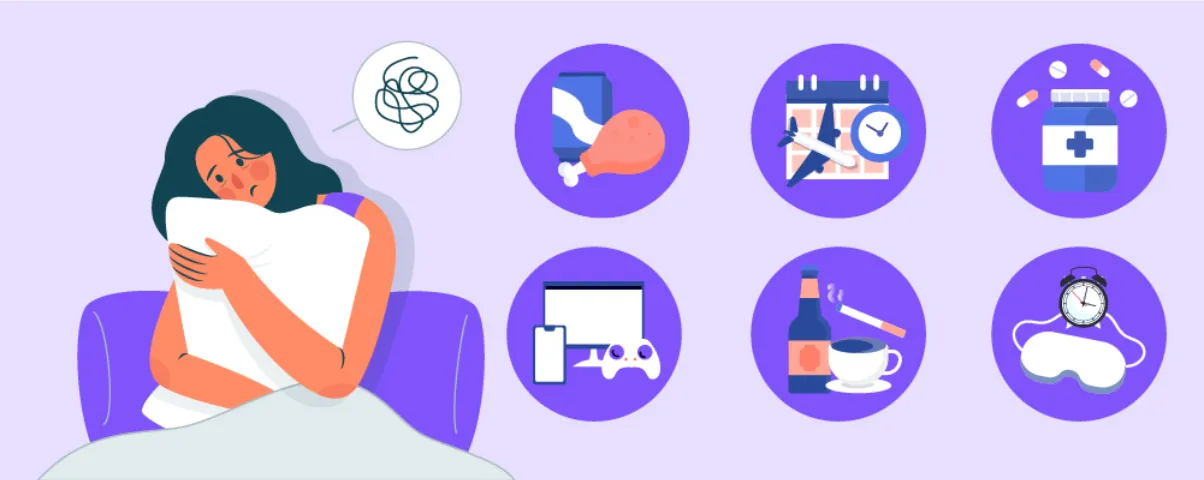
What contributes to insomnia? There are a range of things that can cause insomnia. Some of these are internal, such as general stress keeping us awake, while others can be external (1.) These include poor sleeping conditions such as background noise, or being unable to block out the natural light.
In general, any changes to someone’s mindset, perspective, or lifestyle are likely to have an impact on their ability to sleep. These can be positive or negative changes, and it could be worth paying attention to the type of experiences that you have when you are suffering from insomnia.
Stress
One of the main causes for insomnia is stress. Many people with insomnia feel as if their mind is working overtime in an attempt to process information. The same can be done for individuals that have something stressful happening the following day (21.)
If someone is not processing their stress in a healthy way, then it is likely to keep them up at night. This is one of the most common causes of insomnia, and many people find themselves up at night overthinking a particular situation that happened in the past, or that has yet to happen.
Poor Sleeping Habits
Another contributor to insomnia is poor sleeping habits. These can emerge as a result of poor sleep hygiene, and a lack of routine surrounding sleep.
Make sure you are looking after yourself and setting a realistic routine so that your mind can rest, and your body can heal. People who change their routine very often are also more prone to insomnia (22.)
Eating Too Much Later In The Evening
Similarly, eating anything that is overly sugary less than one hour before bedtime can make you feel alert. It is likely that eating anything with a high fat content will also sit in your stomach without being digested correctly.
This can lead to a feeling of discomfort, and even increase your chances of bloating. Try to avoid eating in the evening, or at least one hour before you head to bed.
Eating too much in the day can also contribute to insomnia, because the stomach and gut in general need to work even harder. This is so that the body can digest everything correctly. Eating too many calories in comparison to what your body needs can lead to a much more challenging experience when it comes to falling asleep (23.)
Certain Medications
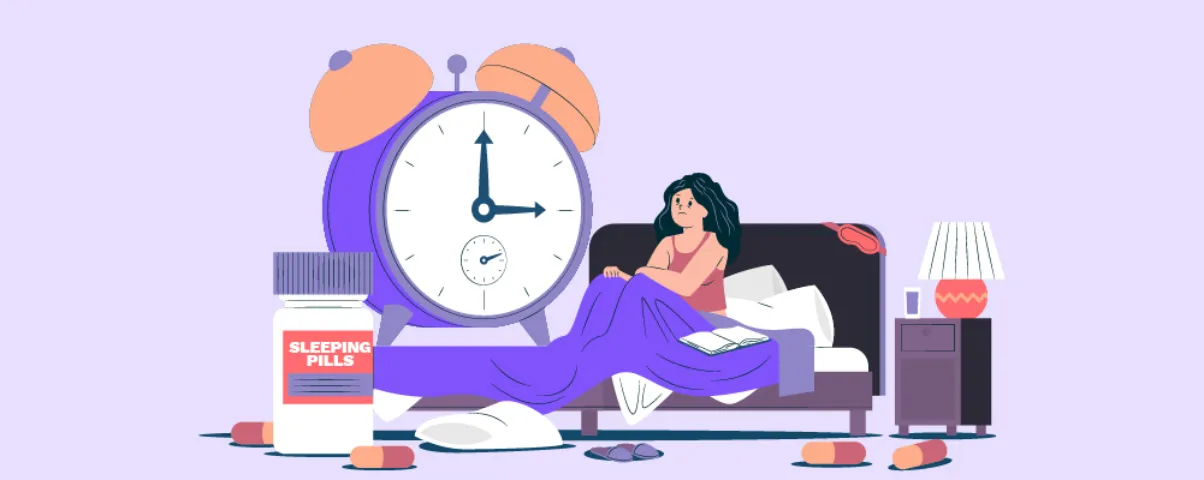
Drug-induced insomnia is surprisingly common, and it can be caused by a range of medications. Both psychotropic and non-psychotropic medications have been known to increase someone’s likelihood of experiencing insomnia, as well as feeling sleepy during the day (24.)
There has also been research to suggest that certain allergy medications, SSRIs, anti-inflammatory corticosteroids, beta blockers, and nicotine replacement medications can lead to insomnia (25.)
Medical Conditions
Similarly, there are various medical conditions known to contribute towards insomnia. These include Alzheimer’s, diabetes, kidney disease, multiple sclerosis, and thyroid conditions (26.) Each have their own range of symptoms, and one of these can be insomnia.
In some cases, it could be the medication that leads to insomnia. However, there are a range of medical conditions which have been associated with an increased difficulty getting to sleep as well as staying asleep.
Caffeine, Alcohol Or Nicotine Intake
Anything that can impact your state of alertness is likely to lead to insomnia, or have an impact on your sleep. Because of this, it is important to be mindful of your caffeine intake, alcohol consumption, and nicotine use (4.)
Consuming any of these in excessive amounts can lead to insomnia and difficulty sleeping at night. If you find yourself struggling to sleep at night, then it is even more important to be mindful of the different forms of caffeine, alcohol, and nicotine that you use in the day (2.)
Sleep Disorders
There is also evidence to suggest that individuals who suffer from different sleep disorders are more likely to experience restless nights and insomnia (27.) These include conditions such as abnormal sleep behaviors.
These can be defined as restless leg syndrome, and parasomnias like sleep paralysis, sleepwalking, and regular nightmares. Those suffering from conditions such as sleep apnea are also more likely to suffer from insomnia (28.)
Change In Activity
Insomnia and someone’s overall quality of sleep can be influenced by their activity levels (29.) This means that any changes to your levels of physical activity can impact how well you are able to sleep at night.
There is a bidirectional relationship between activity changes and sleep, and the body and mind take a little time to adjust to these types of changes. Engaging in regular physical activity can lead to a better relationship with sleep, and ensure that you are getting a good quality sleep consistently (30.)
Change In Lifestyle
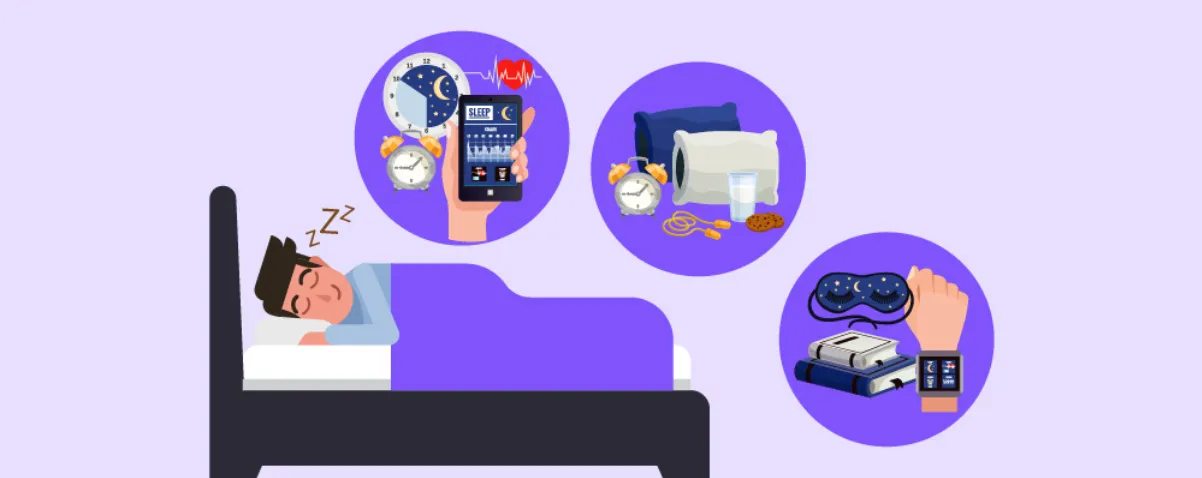
In a similar way that lifestyle changes having the power to reduce insomnia and promote a sound sleep, there are certain changes that can result in insomnia.
These include eating or drinking anything containing caffeine after lunch, eating less than two hours before bed, excessive screen time, engaging in stimulating activity before bedtime, and going to bed at different times (31.) It is typically recommended that you try to avoid these in order to greatly reduce your chances of developing insomnia.
Change In Health
There are multiple ways in which your health can lead to insomnia, even when it does not seem obvious. For example, any changes in hormone production can increase the feeling of alertness when you get into bed (28.)
Similarly, conditions impacting overall health within the body such as heartburn, chronic pain, and diseases such as cancer, are known for contributing to insomnia. Individuals with any underlying health condition are usually more vulnerable to sleep disorders and are more likely to suffer from insomnia or disrupted sleep patterns (28.)
Treatment For Insomnia
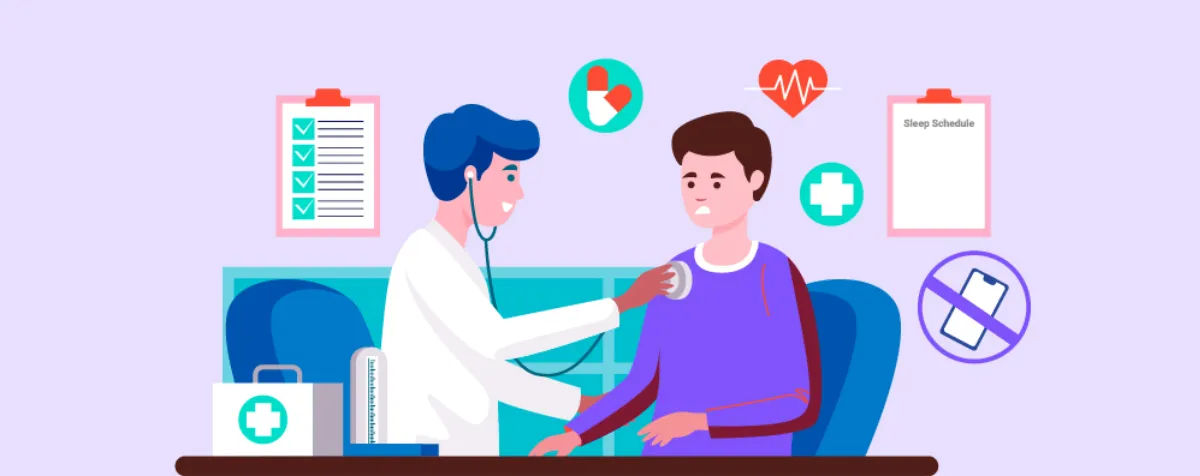
So how can insomnia be treated? Are there any recommended treatments for this condition? There are several ways in which insomnia can be prevented, diagnosed, and treated16, depending on someone’s lifestyle and the severity (14.)
Diagnosis
Firstly, it is essential that individuals suffering from countless sleepless nights are seeking correct diagnosis. This can allow them to access different treatment options and explore unique avenues that could work for them (28.)
One of the first things that someone will need to do when they are looking to get formally diagnosed with insomnia is to keep a sleep diary (27.) Keeping a log of each night’s sleep in the morning and things that you did in the day which could have affected this is a great resource for you as well as healthcare professionals.
It can make them take you more seriously, and provide you with practical suggestions (14.) Try to keep your sleep diary for two weeks in order to give as much information as possible to a healthcare provider (16.)
Because insomnia can be caused or worsened by a range of conditions, a sleep doctor may need to carry out a comprehensive physical exam. This can show them any underlying ailments that could be causing discomfort at night (32.)
A doctor is likely to examine your head, neck, and take bloods for a thyroid function test. The key of the physical exam process is to rule out anything that could be contributing to insomnia, which could be treated in order to reduce the number of sleepless nights (33.)
Similarly, it could be worth taking part in a sleep study if this is offered to you (33.) These usually take place in accredited sleep centers, and allow professionals to get a more comprehensive viewpoint of the issues faces when you are sleeping (16.)
They are able to rule out certain conditions like severe nightmares, sleepwalking, and sleep paralysis, and it can lead to a formal diagnosis of insomnia (28.)
Relaxation Techniques
One of the best ways to settle your mind when you are suffering from insomnia, sleep anxiety, or stress in general, is using relaxation techniques (34.) These include various breathing exercises such as diaphragmatic breathing and the 4-7-8 method.
Other techniques include meditation (35), visualization, and progressive muscle relaxation. Biofeedback is another technique known for promoting relaxation within the mind and body. There have been some cases where these techniques allow a better night’s sleep to be achieved (36.)
If you find yourself struggling to fall asleep and settle your mind for the night, it could be worth focusing on your breathing or practicing visualization. Some people find that imagining each of the muscles in their body contracting and relaxing can be comforting, and allow their brains the opportunity to switch off.
Stimulus Control Therapy
Another approach to insomnia with proven results is stimulus control therapy (37.) The process involves breaking negative cycles that the mind associates with sleep, and encouraging individuals to gradually drift off into a deep sleep. People who spend more time in their bedroom working, watching TV, and more during the day are more likely to find it hard to fall asleep at night.
Stimulus control therapy involves associating the bed with only sleep. By encouraging people to remove any distracting stimulus, such as thinking about work etc., individuals can challenge any existing beliefs or subconscious associations surrounding bedtime (38.) This can be a great way to adjust how your brain sees your bedroom, and to create the best environment for sleeping in.
Sleep Restriction
A similar approach is used when it comes to implementing a sleep restriction for insomnia. Individuals that spend more time during the day napping or resting on their bed are less likely to fall asleep by nighttime. Sleep restriction is an excellent tool for making people with insomnia aware of how little sleep they are getting each night (39.)
Some approaches to sleep restriction involve limiting the time spent in bed once the person wakes up in the night or in the morning. Others involve waiting until you are tired to go to bed. It may seem counterintuitive to restrict your sleep when you are suffering from insomnia, but it is certainly worth speaking to a healthcare professional about this approach.
Light Therapy
Being able to reset the body’s natural circadian rhythm can be an excellent way to treat insomnia in many cases. This can be done using light therapy boxes, which allow individuals to experience similar effects to natural sunlight exposure.
It can help with a range of sleep disorders and conditions limiting someone’s ability to sleep at night. Light therapy has been known to relieve symptoms of depression, and boost the brain’s melatonin production (40.)
Melatonin
Commonly known as the sleep hormone, melatonin can be taken as a supplement to help people fall asleep faster. There are also benefits for individuals with delayed sleep phase syndrome (41.)
There is limited evidence to suggest that melatonin helps achieve a higher quality of sleep in general (42.) However, this hormone is produced naturally within the body, and levels of melatonin are higher during the evening.
Supplementing melatonin in the evening can promote a sense of relaxation, which allows individuals to fall asleep easier (41.) Melatonin is available in tablets, gummies, and more. However, it is highly recommended that you speak with your doctor about the benefits and concerns about taking these in the evening before trying them out. This is because there are a range of different products available which have been made in slightly different ways.
Summary
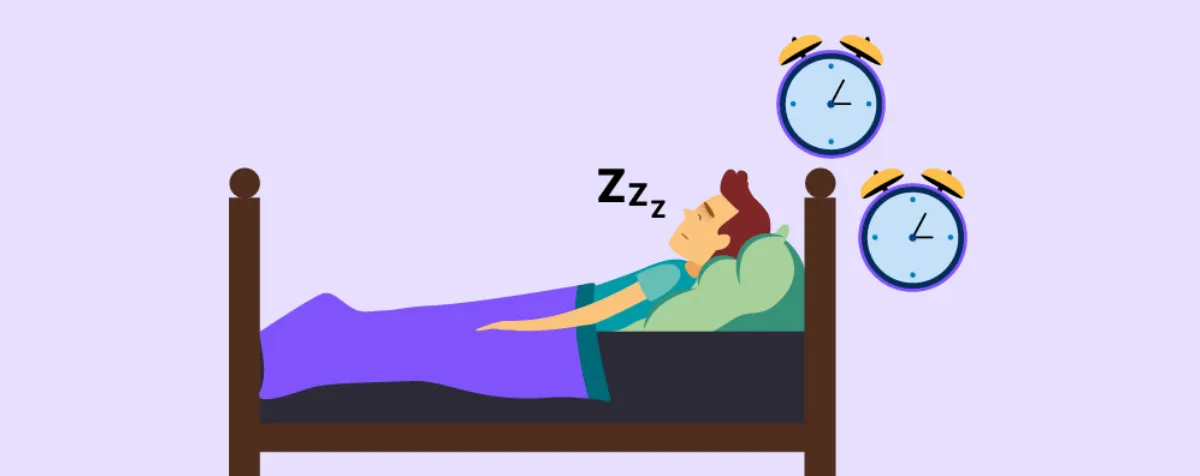
Getting a good night’s rest is a delicate balancing act which needs to be achieved with careful consideration over the sleeping conditions, and by practicing good sleep hygiene. Routine is key, and it can help train your brain into more positive habits to allow your body to heal overnight and ensure you are ready for the following day.
Insomnia can be a highly limiting condition that restricts someone’s ability to focus in their everyday life. It may lead to issues in their energy levels, and inability to engage with their work. Because sleep can be disrupted by a range of factors, it is important to take your sleep routine seriously in order to get as much sleep as possible.
Similarly, it is essential to work on your attitude surrounding sleep. Some people can have negative experiences surrounding sleeping at night, and they may lie awake thinking about these. Because of this, it could be beneficial to speak with a healthcare professional in order to get a formal diagnosis of insomnia.
Ensuring that you are getting a high quality rest each night is commonly overlooked by the modern world. As a result, there are many of us that could benefit from additional sleep resources and recommendations from experts.